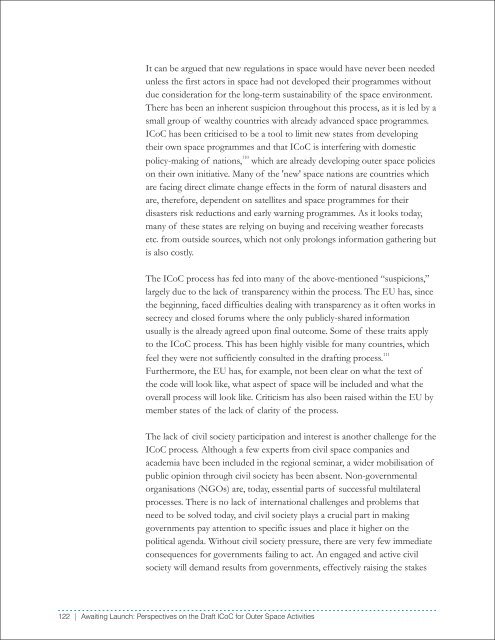AwaitingLaunch_1397728623369
AwaitingLaunch_1397728623369
AwaitingLaunch_1397728623369
You also want an ePaper? Increase the reach of your titles
YUMPU automatically turns print PDFs into web optimized ePapers that Google loves.
It can be argued that new regulations in space would have never been needed<br />
unless the first actors in space had not developed their programmes without<br />
due consideration for the long-term sustainability of the space environment.<br />
There has been an inherent suspicion throughout this process, as it is led by a<br />
small group of wealthy countries with already advanced space programmes.<br />
ICoC has been criticised to be a tool to limit new states from developing<br />
their own space programmes and that ICoC is interfering with domestic<br />
110<br />
policy-making of nations, which are already developing outer space policies<br />
on their own initiative. Many of the 'new' space nations are countries which<br />
are facing direct climate change effects in the form of natural disasters and<br />
are, therefore, dependent on satellites and space programmes for their<br />
disasters risk reductions and early warning programmes. As it looks today,<br />
many of these states are relying on buying and receiving weather forecasts<br />
etc. from outside sources, which not only prolongs information gathering but<br />
is also costly.<br />
The ICoC process has fed into many of the above-mentioned “suspicions,”<br />
largely due to the lack of transparency within the process. The EU has, since<br />
the beginning, faced difficulties dealing with transparency as it often works in<br />
secrecy and closed forums where the only publicly-shared information<br />
usually is the already agreed upon final outcome. Some of these traits apply<br />
to the ICoC process. This has been highly visible for many countries, which<br />
111<br />
feel they were not sufficiently consulted in the drafting process.<br />
Furthermore, the EU has, for example, not been clear on what the text of<br />
the code will look like, what aspect of space will be included and what the<br />
overall process will look like. Criticism has also been raised within the EU by<br />
member states of the lack of clarity of the process.<br />
The lack of civil society participation and interest is another challenge for the<br />
ICoC process. Although a few experts from civil space companies and<br />
academia have been included in the regional seminar, a wider mobilisation of<br />
public opinion through civil society has been absent. Non-governmental<br />
organisations (NGOs) are, today, essential parts of successful multilateral<br />
processes. There is no lack of international challenges and problems that<br />
need to be solved today, and civil society plays a crucial part in making<br />
governments pay attention to specific issues and place it higher on the<br />
political agenda. Without civil society pressure, there are very few immediate<br />
consequences for governments failing to act. An engaged and active civil<br />
society will demand results from governments, effectively raising the stakes<br />
122 | Awaiting Launch: Perspectives on the Draft ICoC for Outer Space Activities








